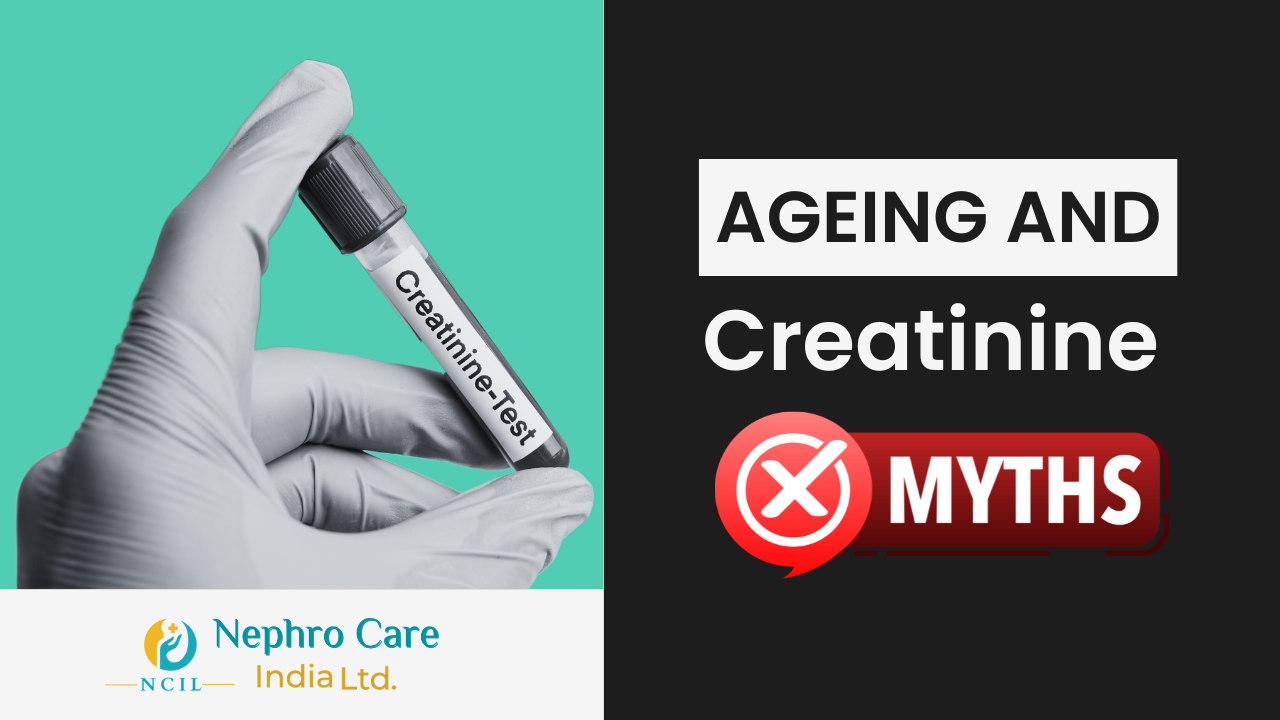

As we age, our bodies undergo numerous physiological changes, and one area of concern for many individuals is the health of their kidneys, often evaluated through the measurement of creatinine levels. Creatinine, a waste product generated from muscle metabolism, is excreted from the body by the kidneys. However, there is a plethora of misinformation, particularly about the aging process. In this article, we aim to dispel common misconceptions and provide insights into the real effects of aging on creatinine levels.

One of the most prevalent misconceptions is the automatic association of high creatinine levels with kidney failure. While elevated can indeed serve as a marker of kidney dysfunction, particularly in severe cases, it’s crucial to emphasize that it’s not always a direct indicator of failure. As individuals age, their muscle mass diminishes, resulting in reduced creatinine production. Consequently, older adults might exhibit higher levels due to decreased kidney filtration capacity. It’s important to recognize that elevated creatinine alone may not signify kidney failure but could simply be a sign of natural aging.
Fact: Aging may affect kidney function, but elevated creatinine levels shouldn’t always be a cause for immediate concern.
It is widely believed that creatinine levels should remain stable regardless of age; however, this is not entirely accurate. As we age, the decline in muscle mass, a significant contributor, can cause variations in creatinine levels. Additionally, age-related declines in kidney function may lead to slightly elevated creatinine levels. Therefore, what is considered normal for an 80-year-old may differ from what is normal for a 30-year-old.
Fact: It is imperative to recognize that creatinine levels naturally vary depending on age. As a result, the criteria for “normal” ranges should be customized for specific age brackets.
The common belief is that a single measurement of creatinine is enough to evaluate the overall health of the kidneys. However, factors such as diet, muscle mass, hydration, and medication use can have a substantial impact on these levels. For older adults, it’s important to conduct additional assessments of kidney function, such as measuring the glomerular filtration rate (GFR), to obtain a more comprehensive evaluation.
Fact: When assessing creatinine levels, it is crucial to consider them in relation to other test results and pertinent factors.
Get ready for some fascinating insights! It’s crucial to recognize that although it’s widely believed that aging causes an increase in creatinine levels, not all older adults will necessarily go through this. Numerous factors can impact kidney function and creatinine levels in older adults. Maintaining a healthy and balanced diet, engaging in regular physical activity, staying well-hydrated, and steering clear of nephrotoxic substances like certain medications and excessive alcohol, can all have a significant impact on preserving optimal kidney function and keeping creatinine levels stable in older adults.
Fact: As people grow older, it’s crucial to recognize that their lifestyle decisions can have a major impact on their kidney health and creatinine levels. It’s exciting to think about our power to positively influence our health as we age.
It is a common misconception that diet has minimal impact on creatinine levels, but this is not entirely accurate. High-protein diets, for instance, can result in a transient increase in creatinine levels due to the breakdown of proteins into byproducts. While this does not necessarily indicate kidney damage, it can lead to a temporary spike that may be misinterpreted.
Fact: Dietary factors, particularly protein consumption, can exert a temporary influence on creatinine levels.
It is a common misconception that age-related decline in kidney function is irreversible. While it is true that kidney function naturally decreases with age, lifestyle modifications, regular medical monitoring, and appropriate medications can effectively preserve or enhance kidney health.
Fact: With the implementation of suitable lifestyle adjustments and medical interventions, kidney health can be optimized or sustained regardless of age.

Ensure Adequate Hydration: Remember to maintain adequate hydration levels as dehydration can lead to temporary increases in creatinine levels. It is crucial to consume an ample amount of fluids consistently throughout the day.
Optimize Dietary Management: Pay close attention to your dietary habits by monitoring your protein intake and reducing your sodium consumption. A well-balanced diet plays a critical role in preserving renal function.
To get more information about dietary management, You can join our diet group🍓🥒🍉🥬
Promote Regular Exercise: Incorporate regular physical activity into your routine to promote muscle health and support optimal balance.
Join our MUKTI team for further details
Monitor Medication Impact: Be vigilant about the potential impact of medications on your kidney function. Before starting any new prescriptions, seek guidance from a healthcare professional regarding their potential renal implications.
Prioritize Regular Assessments: Make it a priority to undergo routine assessments to monitor your kidney function. Early detection of any abnormalities through regular monitoring is essential for facilitating timely intervention.
It’s important to keep in mind that creatinine levels serve as a crucial marker for kidney function, particularly as we grow older. However, it’s essential to interpret these levels within the broader context of our overall health. Misinterpretations of creatinine levels can cause undue concern or, even worse, overshadow genuine kidney health concerns. By staying well-informed and collaborating with healthcare experts, we can effectively safeguard the health of our kidneys and, consequently, our overall well-being as we age.
10. Creatine Explained: Benefits, Myths Debunked, and How to Use It (avantpharmacy.com)